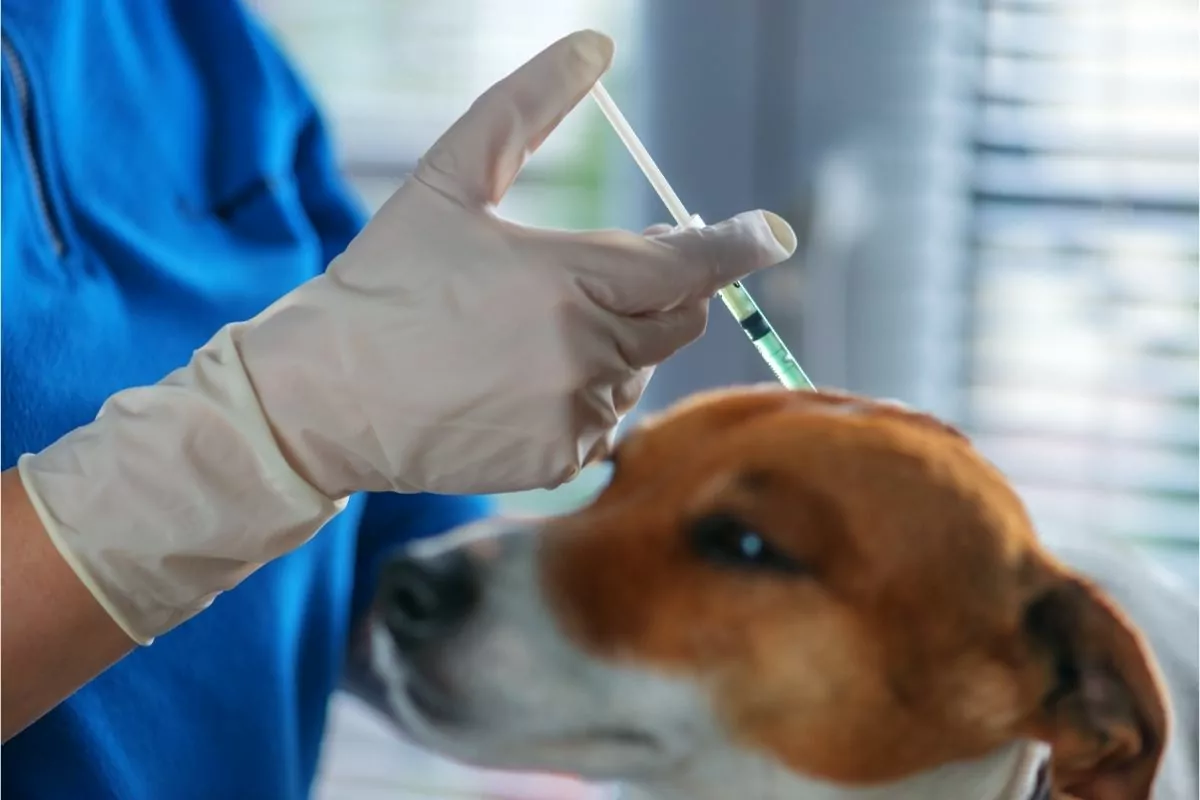What is the Cytopoint Injection for Dogs?
Have you ever seen a dog with allergies? They can seem like they’re itching all over and like nothing can make it stop. In these cases, a cytopoint injection for dogs may be precisely what is needed!
A cytopoint injection is a reasonably new treatment for dogs with skin allergies that occurs due to allergies towards environmental allergens. Still, despite being the new kid on the block, it is showing promising results! But, how does the cytopoint work, and is it useful for you?
Take a read below!

How Does Cytopoint Work?
Cytopoint injections aren’t like the anti-itching medication, drugs, and injections you already know. Instead, they work in a completely new, different, and perhaps better way! Put in as few words as possible; the cytopoint injection works like your dog’s own immune system to combat the itching.
“Regular” pharmaceutical drugs (often glucocorticoids) are made to alleviate itching and other allergy symptoms by inhibiting the inflammatory response that occurs when a dog is allergic to something – thereby removing the itching. These drugs can be exceptionally effective, but they unfortunately also, in most cases, come with a host of unwanted side effects.
To explain cytopoint, it is worth discussing why a dog itches at all. First, allergens (tiny particles of anything a dog may be allergic towards) penetrate the skin barrier. These allergens are what then cause an allergic reaction. The body and immune system think the allergen is “dangerous.” As a defense mechanism, the body releases proteins.
These proteins attach to nerves located within the skin. These nerves then signal to the brain that something is itching – triggering the urge to scratch. It is in part of this chain of events that cytopoint injections come into play. Cytopoint injections are a protein and a biological therapy – not a drug, in the true sense of the word.
Cytopoint contains the active product, an engineered antibody, called lokivetmab. Simply put, the antibody attaches itself to the nerves instead of the protein released by the body. This inhibits the “itching signal” otherwise sent to the brain.
This inhibition means that the dog will no longer feel the itch, and by extension, won’t want to scratch itself further – often a huge relief for both dog and owner. The lack of itching and scratching also means that the skin will finally have time to heal, further helping by removing some of the causes of the itching to begin with.
What is the Cytopoint Injection for Dogs Used for?
We’ve already talked about how cytopoint injections for dogs work to alleviate itching. However, it’s not for all and any type of itching. Cytopoint is a targeted treatment of itching associated with atopic dermatitis.
Atopic dermatitis is a chronic skin condition that occurs in relation to environmental allergies. Just like us, humans or dogs can be allergic to small particles found in the environment. For example, dogs can be allergic to grass or pollen, molds or dust mites, and many other things. Some dogs may even be allergic to perfume!
If your dog is “only” allergic to grass pollen, it may only suffer from seasonal allergies. However, if they’re allergic to dust, they may experience varying degrees of discomfort and itching all year round.
When dogs experience an itch, they scratch, which leads to skin conditions like atopic dermatitis, often resembling what humans call a rash or eczema. Over time the condition can worsen if your dog isn’t treated and become a severe health and welfare concern for your dog.
Luckily, veterinarians have cytopoint – as well as other options – up their sleeves. Cytopoint is a small painless injection placed just under the skin of your dog by a veterinarian, or if you are further along in a treatment plan, by a veterinary nurse.
The Longevity of Cytopoint for Dogs
One of the significant benefits of cytopoint injections is that they provide dogs with long-lasting relief from itching! The active ingredients in the injection are slowly released into the body, meaning that one cytopoint injection can provide allergy relief for four to eight weeks.
A downside to the cytopoint treatment is, of course, that it needs to be administered at a veterinary clinic or -hospital by a veterinarian or a nurse. That gives you and your dog four, maybe eight, wonderful weeks of no itching – but it will also mean a trip to the vet once every or every other month.
How long the injection works for your specific dog is unknown until tried. Every dog is unique, and its response to the injection is unique as well. Some dogs experience almost immediate and dramatic itch relief, with a long-lasting effect. Other dogs experience a more modest and short-lived impact of the injection.
You’ll need to stay in close contact with your veterinarian to report precisely how your dog is doing after the injection. Also, to discuss when a new injection is needed again – or if it is necessary to try something else for you and your dog.

Apoquel vs. Atopica
A retrospective study showed that 87.8% of patients receiving cytopoint injections were regarded as “treatment successful.” Meaning that the majority of dogs experience some level of relief when receiving cytopoint injections. However, cytopoint injections may not be enough to combat the effects of atopic dermatitis – and it doesn’t have to stand alone.
Another frequently used treatment option is Apoquel, containing the active ingredient Oclacitinib. Apoquel for dogs inhibits some of the cytokines (proteins) released by the body as an inflammatory response to allergens. Thus, it both works to alleviate the itching and has anti-inflammatory properties.
Atopica is another frequently utilized product in the fight against itching. Unlike Apoquel and cytopoint, this product contains a drug called ciclosporin. An immunosuppressive drug that works directly on the immune system to inhibit the production of the proteins associated with itching within the body.
The main difference between the products, cytopoint injections, Apoquel, and Atopica, is the method of administration. Cytopoint is an (on average) once-a-month injection. Apoquel is a daily dosage. Atopica is, to begin with, a daily dosage pill, which may, over time, be reduced to one tablet every third or fourth day.
Cytopoint works primarily to target itch associated with environmental allergies. But, the injections can also assist dogs with food allergies. Apoquel is, however, labeled to treat irritation and itching associated with any type of allergy. Including environmental-, food- and flea-allergies. Atopica is only limited to treating atopic dermatitis but can also be used on cats.
Apoquel and cytopoint are two different products but with quite similar effects. Apoquel has the benefit of no vet visits being needed – at least not very frequently. However, cytopoint has the advantage of being long-lasting, and if the owner doesn’t consider a quick trip to the vet an issue, it might be far easier for the owner. Cytopoint, unlike Apoquel, can also be used for puppies!
Atopica works on the “step” before Apoquel and Cytopoint as Atopica prevents the proteins that lead to itching from even being produced, to begin with. However, Atopica cannot be used for puppies or weighs less than 2 kg (4.4 lbs) and comes with a few more side effects than Cytopoint. Side effects are rare but can include diarrhea and vomiting, as well as muscle cramps.
Apoquel also comes with the risk of a few more side effects, compared to cytopoint, including diarrhea and vomiting – although any owner should note that these are rare. With cytopoint injections, only lethargy (tiredness) and allergic reactions to the injection have been reported, with these side effects only occurring in very rare cases as well.
Sometimes, especially if the dog is suffering from severe itching, veterinarians can use the three products in combination with great success. But, it’s all about the individual dog, the owner, and the veterinarian treating the dog. If you are in any way in doubt about the treatment your dog is receiving, contact a veterinarian.
FAQs on the Cytopoint Injection for Dogs
Where can I get Cytopoint?
Cytopoint injections can only be administered by a veterinarian or under the authority of a veterinarian as it is a subcutaneous injection (an injection given right under the skin).
When does Cytopoint begin to work?
Most dogs experience itch relief less than one day after the injection is given. Remember, though, that even though cytopoint is generally very effective, flare-ups can happen, so keep an eye on your dog!
How will I know when it’s time for the Cytopoint injection?
If your dog starts showing signs of itching like scratching, scratching, or rubbing its ears on other surfaces, it is time for another injection as soon as possible – before excessive skin damage occurs.
Is Cytopoint safe for my puppy?
Cytopoint is a very safe treatment option for both adult dogs and young puppies. However, always consult your veterinarian and inform them of any other medication or supplement your dog may be receiving.
Can my dog get a Cytopoint injection if they are on other medication?
Yes, cytopoint injections can be used concurrently with other types of medications and drugs. As it is an antibody protein, it is broken down and recycled by the body.
Are there any side effects to Cytopoint usage?
Some anecdotal evidence suggests that some dogs may be more tired after the injection, with some arguing that this tiredness can also stem from the visit to the veterinarian in general. Generally, the worst seen side effect is that the injections stopped working after a few times, but even this was very rare.
How is Cytopoint given?
Cytopoint is given as a small injection just under the skin. The veterinarian will use a tiny needle. The fluid also won’t need to go into any muscle (unlike what vaccination dosages do); your dog shouldn’t experience any or minimal discomfort when being injected.

Summary
We all, owners and veterinarians, hate to see our furry friends in discomfort, and as well know how uncomfortable it is to be itching, we want to help. Luckily there’s help out there for the itching individuals, and cytopoint injections may be just the savior your itchy dog needs!
